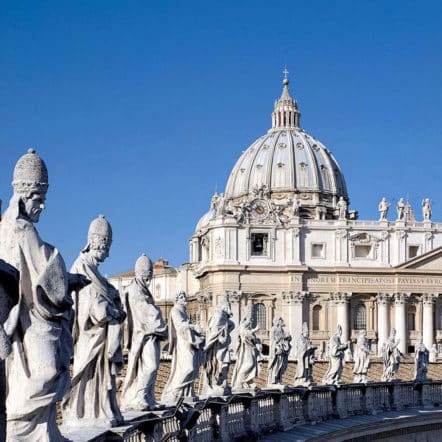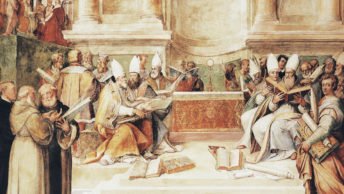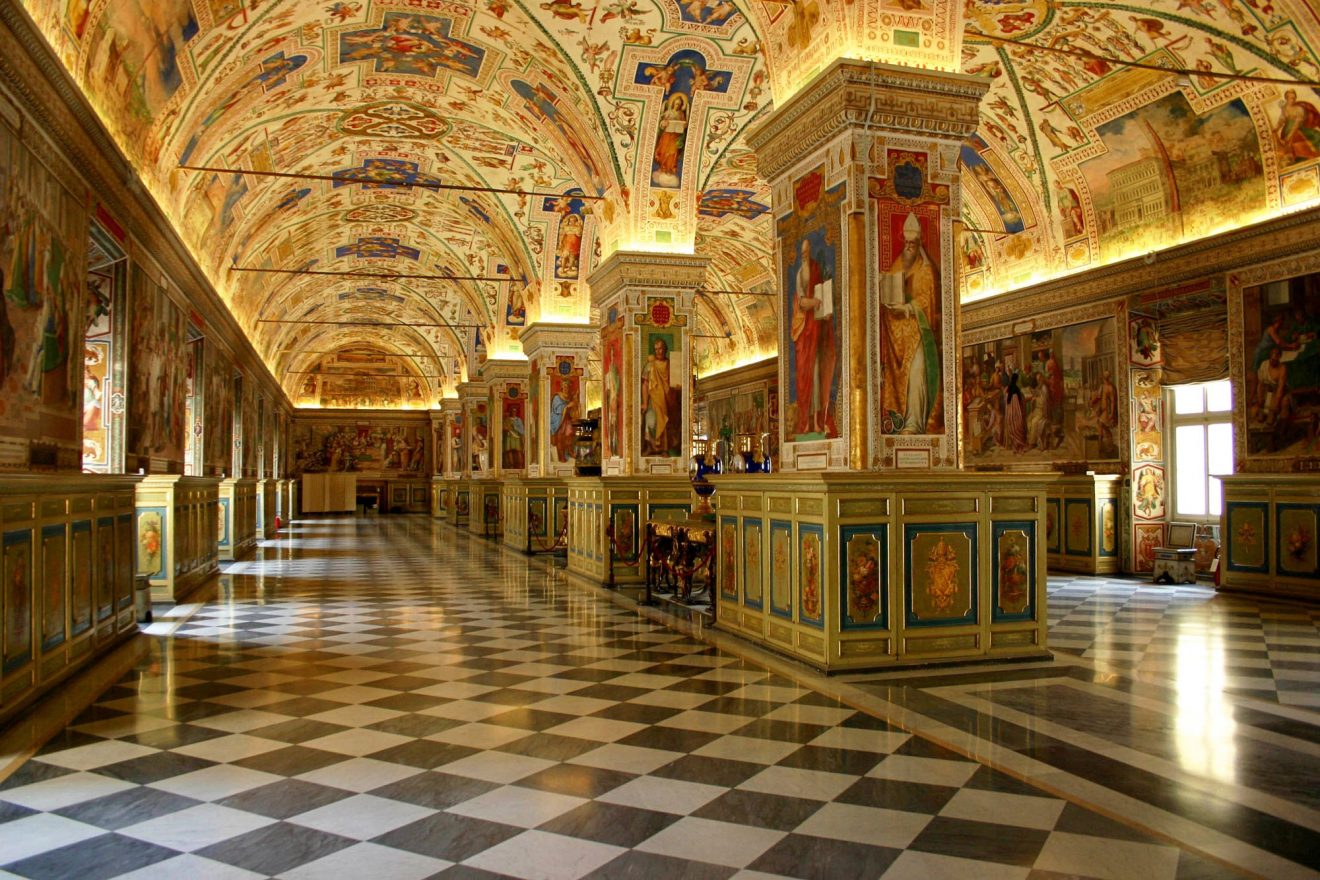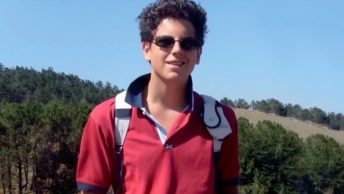A few mornings ago, while enjoying my morning swim, I noticed a small bird sitting atop a tall palm tree. It was somewhat windy and the tree bent first one way and then the other. With each gust the bird clung more tenaciously. The drama continued for almost a half hour and I began to wonder why the little creature didn’t give up and fly away. Then I smiled as I recalled that someone had recently expressed a similar wonder about my remaining in the Catholic Church.
That individual was responding to an essay I had published, “The Catholic Church and Women,” arguing that an ancient animus toward women has influenced a number of Catholic teachings and that the Church should respond appropriately. The individual wrote, “Professor Ruggiero [might] be more comfortable with his inclinations if he were to seek out a Protestant sect more in conformance to his thinking.” That was a nuanced way of saying, “If you don’t like it, why don’t you leave?”
Though I can’t be sure why the bird continued to cling to the palm tree, I can explain why I haven’t left the Catholic Church. The main reasons are these:
I still embrace the Catholic Creed in its entirety (both the brief Apostle’s version and the longer Nicene version), including that Christ is the only Son of God, was “conceived by the Holy Spirit, born of the Virgin Mary,” was crucified and died, rose from the dead, and will “judge the living and the dead.”
I still believe that the Catholic Church can alone legitimately claim unbroken succession from the Apostles, and that is meaningful.
I still believe in the Real Presence of Christ in the Eucharist and the efficacy of that Sacrament and the others.
I still believe that Christ was given “all authority . . . in heaven and on earth,” and that he promised to be with the Apostles “always, even to the end of the age.” Matt 5:18-20 (The phrase “end of the age” has also been translated “end of the world” and “end of time.” I believe “end of time” is more consistent with the earlier word “always.”) I must add that believing Christ will always be with the Apostles does not require believing that the successors of the Apostles have always been, or will always be, with Christ.. There is a significant difference between the two formulations. The second is open to the possibility of the Holy Spirit offering guidance that the Apostles (and the hierarchy), for one reason or another, do not embrace.
The answer I have given so far will not be completely satisfactory to some people. They will say, “Being Catholic means accepting everything the Church teaches as a matter of faith. When you are inclined to question any Church teaching, the only appropriate response is to suppress that impulse and give unquestioning assent to the teaching.”
For those people I have a question: What if the teaching is contradictory or unclear? An example of a contradictory teaching is the Church’s teaching on the right to private property. (I discuss this at some length in “American Catholics and Social Justice.”)
In Rerum Novarum Pope Leo XIII declared that the right to private property is “inviolable” and that “neither justice nor the common good allows” taking from some to give to others. But in Caritas in Veritate Pope Benedict VI supported the idea of “redistribution of wealth,” and the U.S. Council of Catholic Bishops not only affirmed but expanded on Benedict’s view in their statement, “Economic Justice for All.”
These teachings of Leo and Benedict are incompatible and the Church has not addressed that problem. So which one should Catholics assent to? We are forced to examine the arguments and evidence offered for each position and form our own judgment. (Leaving the Church and becoming, let’s say, a Presbyterian will not overcome the contradiction between the papal teachings.)
An example of an unclear teaching is that on Salvation. (I discuss this at length in “The Catholic Church and Salvation” (Parts 1-4).
The traditional teaching about salvation held by the Catholic Church, and considered infallible, has been“outside the Church there is no salvation” (extra ecclesiam nulla salus). Nevertheless, as one Catholic publication explains, the Church has “reformulated” the teaching to be “more positive.” Here is the phrasing of the reformulation: “All salvation comes from Christ the Head through the Church which is his Body.” (This is certainly softer, as well as a little vaguer, but it doesn’t seem more “positive.”)
Another publication offered a longer explanation in which these two sentences are central: “There is no salvation apart from Christ and his One, Holy, Catholic, and Apostolic Church. Again, this is an infallible teaching and not up for debate among Catholics.” This explanation is neither soft nor positive and it’s definitely not more hopeful for those outside the Catholic Church.
Judging from the longer article, there is no lack of clarity about the teaching on salvation at all, and the other publication’s reference to “reformulation” was simply a gentle way of saying nothing has changed. But then a dramatic incident early in 2018 plunged the matter into unmistakable confusion. A young child named Emanuele whispered in Pope Francis’ ear, “Is my atheist father in heaven?” Francis answered, “God has a father’s heart, your dad was a good man, he’s in heaven with him, I’m sure.”
Some would say, “Oh, Francis was just telling a small lie out of kindness.”
But that does not stifle the wondering. If anything, it fuels it. Might Francis really believe what he said? If so, does he believe the centuries-old teaching about salvation was mistaken and therefore not infallible, so Protestants can also be saved? What about Jews? Muslims? Shintoists? Also, if the old teaching on salvation was thought to be infallible but was actually not infallible, might other teachings be mistakenly classified as infallible? Could the doctrine of infallibility itself be mistaken—or at least in serious need of “reforming”?
These examples of a contradictory teaching and an unclear teaching demonstrate that the natural human response in such situations is not to suppress wonder and give unquestioning assent to the teachings, but rather to follow wonder by examining the teachings closely, thinking carefully (and prayerfully), and forming a conclusion. This is the way the human mind seeks truth; and seeking truth, after all, is the function of our God-given minds. (Note: I am not speaking here about teachings classified as mysteries, such as the doctrine of the Trinity, the Virgin Birth, or the Resurrection, which are beyond human understanding and can be embraced only through faith.)
The Church’s discouraging the laity from analyzing its teachings was understandable in centuries past when only clerics were sufficiently educated to do so. But that time is long past. This does not mean that every educated person is equal to the task, or that being educated and intellectually skilled exempts one from error. Far from it. It means only that the hierarchy should acknowledge that the Holy Spirit is free to communicate not just with them but with what might be termed the lowerarchy (lay people plus nuns and priests) as well. Accordingly, it is possible that on any given issue the lowerarchy may possess insights and wisdom missed by the hierarchy. This possibility suggests that the hierarchy practice the virtue of humility by shedding the intellectual cloak of “We are anointed so we know best,” and giving all ideas—especially those that challenge their own—a fair and impartial hearing.
For the laity the lesson of history is almost the opposite. In centuries past, they were less educated than the clergy and depended on them for knowledge of both religious and secular truths. That dependence prevented them from fully realizing that, like the clergy, they were “created in the image and likeness of God” and thus possessors of the precious gift of intellect, the power of which remains enormous despite being weakened by Original Sin. That lack of realization has prevented the laity from understanding, and honoring, the obligation that that goes with that gift—the obligation to use it to seek truth and, when truth is found, to embrace it.
At this point, the error of repeating “Either accept everything the Church says or leave,” to educated people becomes clearer. That saying encourages people to disregard their God-given intellects. And that is an insult to God.
How, then, should Catholics approach Catholic teachings? In a word, seriously. First, they should desire those teachings to reflect God’s own truth and wisdom, and hope that they do so. Secondly, they should have the humility to recognize their human limitations and study the teachings carefully with an open mind and heart to understand their history and meaning. Thirdly, if a teaching seems confused, contradictory, or at odds with their experience, they should resist drawing an immediate conclusion. Then they should consult the views of knowledgeable people representing various perspectives on that issue.
Finally, they should reflect prayerfully on the facts they found and the perspectives they consulted and decide whether they can with intellectual honesty and in good conscience give assent to the teaching. If they cannot support it, they should decide whether circumstances warrant making their dissent public. For theologians and certain other scholars, public expression of what they believe to be the truth might go well beyond acceptable to obligatory.
As to why I choose to remain a Catholic, I do so for all the reasons expressed above, plus one more—I want to do everything I can, as a Catholic and a scholar, to help the Church do a better job of representing Christ and His Gospel, including respectfully pointing out what I perceive to be the mistakes of the hierarchy.
Copyright © 2020 by Vincent Ryan Ruggiero. All rights reserved








For his own sake I am delighted that Prof. Ruggiero has decided to “remain Catholic”. His approach to the acceptance of Catholic teaching however, seems heavily tainted in the direction of Protestantism.
His prescription for approaching Catholic teachings (all?) is for each of us to: “…reflect prayerfully on the facts they found and the perspectives they consulted and decide whether they can with intellectual honesty and in good conscience give assent to the teaching. If they cannot support it , they should decide whether circumstances warrant making their dissent public”.
In the pursuit of ‘truth’ in today’s world that’s called ‘relativism’ – your truth is yours, mine is mine, the Church’s is theirs. There are thousands of protestant sects that owe their existence to that mentality.
It appears that the Prof. applied this process to his advocacy for contraception, women’s ordination, and priestly celibacy. Luther would be proud.
There is no question that in the present day under Pope Francis confusion on Catholic teaching abounds. The Profs example of the teaching on salvation is certainly illustrative. The fact is that that teaching has survived as infallible through many challenges over the centuries. Francis’ whispering in the ear of a child does not constitute a cause for doubt except in the mind of those looking for something to doubt. That attitude is fertile ground for a protestant mindset and is, sadly, nourished many times over by the conduct of the current papacy. The answer is not to take the bait with personal speculation but instead to humbly accept what is magisterially taught. If this is called “rigid” then wear that mantle with grace.